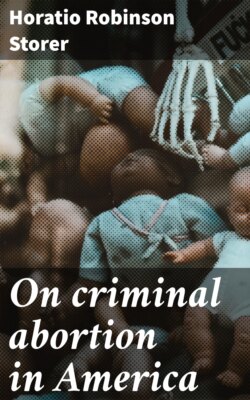Читать книгу On criminal abortion in America - Horatio Robinson Storer - Страница 3
На сайте Литреса книга снята с продажи.
CONTRIBUTIONS
TO
OBSTETRIC JURISPRUDENCE.
NO. I.
CRIMINAL ABORTION.
ОглавлениеTable of Contents
By the Common Law and by many of our State Codes, fœtal life, per se, is almost wholly ignored and its destruction unpunished; abortion in every case being considered an offence mainly against the mother, and as such, unless fatal to her, a mere misdemeanor, or wholly disregarded.
By the Moral Law, the wilful killing of a human being at any stage of its existence is Murder.
In undertaking the discussion at length of this subject, three preliminary facts must be assumed:—
First.—That if abortion be ever a crime, it is, of necessity, even in isolated cases, one of no small interest to moralist, jurist, and physician; and that when general and common, this interest is extended to the whole community and fearfully enhanced.
Secondly.—That if the latter assumption be true, both in premise and conclusion, neglected as the crime has been by most ethical writers and political economists, hastily passed over by medical jurists,[1] and confessedly everywhere the great opprobrium of the law, often indeed by taunt that of medicine, either it cannot in the nature of things be suppressed, as by these facts implied, or its suppression has not been properly attempted. Discarding the former of these alternatives as alike unworthy of belief and proved false by facts hereafter to be shown, it will appear,
Thirdly.—That the discussion now broached is neither supererogatory nor out of place; further, that it is absolutely and necessarily demanded.
Moreover, in order that the importance and various bearings of the subject may be better appreciated, and that the writer’s position and aims may be more fairly understood, it must be borne in mind that there exist to this discussion certain positive and apparent objections, which have, in a measure, given rise to much of the silence and omission alluded to above, and are, in the main, as follows:—
1. The natural dislike of any physician to enter upon a subject on some points of which it is probable that a portion of the profession is at variance with him, either from disbelief in the alleged increase of criminal abortion, unnoticed for reasons shown hereafter, or from a blind reliance on Providence of itself to abate the evil.
2. His fear, lest by any possible chance, by showing the frequency of the crime and its means, he may unhappily cause its still further increase.
3. The reluctance on the part of many of the profession to attack a powerful and acknowledged moneyed interest;
4. And to tell their patients, more commonly than is yet general, most unwelcome truth; thus not merely condemning, but, to their own consciences at least, criminating them;
5. And individually to risk losing practice, if thought more scrupulous than others;
6. And to be brought into more frequent contact with the law, even though for ends of justice;
7. And to exercise greater care and discretion in diagnosis and treatment, lest themselves be brought to answer for malpractice, or worse;
8. And publicly to discuss matters supposed to be generally unknown, and thus seem to throw open professional secrets to the world.
And, finally, grave doubts lest the statements made, though simple and true, should yet appear so astounding as to shock belief, or so degrading as to tend to lessen all faith in natural affection and general morality.
But these objections, so far at least as regards the profession, are undoubtedly but of limited existence; and, on the other hand, as more than counterbalancing them all, are the following arguments:—
That medical men are the physical guardians of women and their offspring; from their position and peculiar knowledge necessitated in all obstetric matters to regulate public sentiment and to govern the tribunals of justice.
That the discussion by them of this crime may very probably be the means, in great measure, of ultimately restraining or suppressing its perpetration.
That such will undoubtedly tend to save much health to the community and many human lives.
And, that, were there no other reason, it is clearly a duty.
I shall accordingly proceed to prove, so far as possible, the truth of every premise as yet stated, and to show the real nature and frequency of the crime: its causes; its victims; its perpetrators and its innocent abettors; its means and its proofs; its excuses, the deficiencies and errors of existing laws, and the various other obstacles to conviction; and, above all, so far as the present series of papers is concerned, the duty of the profession toward its general suppression.
